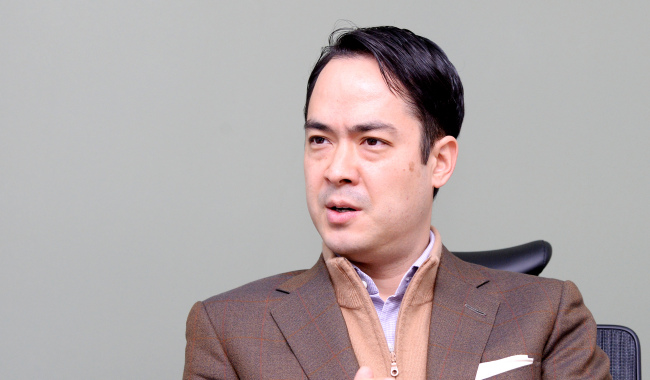Korea ‘ideal’ place for foreigners to launch start-ups
By Park Hyung-kiPublished : Dec. 6, 2013 - 20:41
Korea is the place to be for both nationals and foreigners looking to launch start-ups, especially in the fields of information technology and mobile technology, a foreign entrepreneur based in Seoul said.
Ludolf Ebner-Chung, founder and CEO of Naldo, an online quick-delivery services platform, said that starting a company in Korea may often be a better career move than working at a conglomerate, especially for foreigners.
“For Web-based IT and mobile start-ups, Korea is one of the ideal business spots, offering a wide base of sophisticated customers, a diverse labor market and a well-organized financial system,” Ebner-Chung said in an interview with The Korea Herald.
Ludolf Ebner-Chung, founder and CEO of Naldo, an online quick-delivery services platform, said that starting a company in Korea may often be a better career move than working at a conglomerate, especially for foreigners.
“For Web-based IT and mobile start-ups, Korea is one of the ideal business spots, offering a wide base of sophisticated customers, a diverse labor market and a well-organized financial system,” Ebner-Chung said in an interview with The Korea Herald.

It is not only easy to set up a business but it can also be done quite quickly in Korea, a country where “the Internet is fast and you can find developers in 24 hours.”
The only drawback, he said, is Korea’s legal system, which is still vague and difficult to understand compared to Germany’s “clear-cut” rules and regulations.
He added that the benefits for foreigners seeking to run their own companies are that they can make faster decisions without having to worry about bureaucracy, which is common at bigger Korean companies.
Ebner-Chung, who was born to a German father and Korean mother, said that foreigners could experience limited accessibility and a lack of adaptability while working for Korean conglomerates.
“I had worked at large companies such as LG Electronics and NCsoft, where I realized that there were levels I could not easily reach due to my non-Korean nationality,” Ebner-Chung said.
The former CEO of Yogiyo, a mobile food delivery services company, said that Korea also offers a better environment for start-ups, as the country is more welcoming for foreigners, especially when compared to neighboring countries such as Japan.
“The Japanese culture tends to draw a clear-cut line between the Japanese and the non-Japanese, which is not the case here in Korea,” said Ebner-Chung, who spent several years in Japan before coming to Korea.
Several entrepreneurs have made it in the Korean market over the past years.
However, venture entrepreneurship is still not a preferred option in the country, despite several successful cases.
“This is why Korea needs to have more business superstars like Kim Bum-suk, CEO of social commerce champion Coupang,” he said.
“People will then know that they don’t necessarily have to join Samsung, Hyundai or state-run banks in order to become the next Steve Jobs or Mark Zuckerberg.”
By Bae Hyun-jung (tellme@heraldcorp.com)
The only drawback, he said, is Korea’s legal system, which is still vague and difficult to understand compared to Germany’s “clear-cut” rules and regulations.
He added that the benefits for foreigners seeking to run their own companies are that they can make faster decisions without having to worry about bureaucracy, which is common at bigger Korean companies.
Ebner-Chung, who was born to a German father and Korean mother, said that foreigners could experience limited accessibility and a lack of adaptability while working for Korean conglomerates.
“I had worked at large companies such as LG Electronics and NCsoft, where I realized that there were levels I could not easily reach due to my non-Korean nationality,” Ebner-Chung said.
The former CEO of Yogiyo, a mobile food delivery services company, said that Korea also offers a better environment for start-ups, as the country is more welcoming for foreigners, especially when compared to neighboring countries such as Japan.
“The Japanese culture tends to draw a clear-cut line between the Japanese and the non-Japanese, which is not the case here in Korea,” said Ebner-Chung, who spent several years in Japan before coming to Korea.
Several entrepreneurs have made it in the Korean market over the past years.
However, venture entrepreneurship is still not a preferred option in the country, despite several successful cases.
“This is why Korea needs to have more business superstars like Kim Bum-suk, CEO of social commerce champion Coupang,” he said.
“People will then know that they don’t necessarily have to join Samsung, Hyundai or state-run banks in order to become the next Steve Jobs or Mark Zuckerberg.”
By Bae Hyun-jung (tellme@heraldcorp.com)



![[AtoZ into Korean mind] Humor in Korea: Navigating the line between what's funny and not](http://res.heraldm.com/phpwas/restmb_idxmake.php?idx=644&simg=/content/image/2024/04/22/20240422050642_0.jpg&u=)


![[Exclusive] Korean military set to ban iPhones over 'security' concerns](http://res.heraldm.com/phpwas/restmb_idxmake.php?idx=644&simg=/content/image/2024/04/23/20240423050599_0.jpg&u=20240423183955)
![[Herald Interview] Why Toss invited hackers to penetrate its system](http://res.heraldm.com/phpwas/restmb_idxmake.php?idx=644&simg=/content/image/2024/04/22/20240422050569_0.jpg&u=20240422150649)
![[Graphic News] 77% of young Koreans still financially dependent](http://res.heraldm.com/phpwas/restmb_idxmake.php?idx=644&simg=/content/image/2024/04/22/20240422050762_0.gif&u=)






![[Exclusive] Korean military to ban iPhones over security issues](http://res.heraldm.com/phpwas/restmb_idxmake.php?idx=652&simg=/content/image/2024/04/23/20240423050599_0.jpg&u=20240423183955)



![[Today’s K-pop] Ateez confirms US tour details](http://res.heraldm.com/phpwas/restmb_idxmake.php?idx=642&simg=/content/image/2024/04/23/20240423050700_0.jpg&u=)